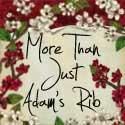 I honestly don't remember a time when Oprah wasn't a household name. An elementary school child during most of the eighties, I wasn't allowed to watch her early-on outrageous talk show and its parade of dysfunction, but that didn't mean her personality, her ideas, her face didn't filter into my life anyway.
I honestly don't remember a time when Oprah wasn't a household name. An elementary school child during most of the eighties, I wasn't allowed to watch her early-on outrageous talk show and its parade of dysfunction, but that didn't mean her personality, her ideas, her face didn't filter into my life anyway.I didn't need to be a fan to see her image plastered across the grocery store checkout aisles, especially when her weight (and hair size) ballooned or shrank. Then, there was the oft-repeated image of Tom Cruise jumping on her couch and of shrieking audience women from her "favorite things" episodes. To this day, the catchy lyrics "It's 4:00, where's everybody gone?" still stick in my head.
Perhaps this background of Oprah is why the title of Stephen Mansfield's newest book intrigued me: Where Has Oprah Taken Us?: The Religious Influence of the World's Most Famous Woman.
The first two chapters gave a basic biography of Oprah's life, from childhood to present, all to form the groundwork for exploring where her present approach to religion and spirituality came from. While this part was less than thrilling to read for non-Oprah fans like myself, the whole book is not about Oprah, nor is it an attempt to bash Oprah.
Mansfield's biographical information is intended to provide an explanation for how a woman raised in a Christian church by a very religious extended family made the leap to the modern New Age spirituality she now claims. By understanding this, the reader can understand how Oprah's turning to spirituality versus established religion has affected American culture as a whole as well as how her choices reflect her entire generation in general.
It is this part of the book that is extraordinarily interesting, when Mansfield analyzes the historical events in America that led to the baby boomer generation separating itself from the confines of established religion to explore the New Age spirituality that began permeating America post World War II.
Most importantly, he shows how Oprah and post-WWII America have taken Eastern religions like Hinduism, Buddhism, and Taoism and refashioned them for an American culture that revolves around the self and self fulfillment as being the focus of life itself, not a God.
The American notion of karma? of reincarnation? of maya? Mansfield explains how these ideas as we Westerners understand them look nothing like what they actually are in their native Eastern religion. Instead, these concepts have all have been "sanitized," secularized, and reinvented for Western culture, resulting in an entirely new religion that is, at best, a hodge podge of misunderstood pieces of Eastern religions and, at worst, contradictory trendy concepts falsely presented as ancient beliefs that cancel each other out into meaninglessness (p. 185).
In short, through the New Age movement of experimental spirituality, America has merely shaped a religion they want to be true.
My one criticism of the book is actually a big one, that Mansfield does not make the final leap to critique Christianity or any other established world religion in America, even though even the established world religions such as Judaism, Islam, or Christianity all have seemingly the same problems of ego-ism, of piecing together a modified gospel just as the New Age spirituality demonstrates.
Mansfield's only mention of this concept is in passing with only the faintest of echoes of David Platt's Radical: "Christian churches have created a Christianity of therapeutic preaching, me-oriented worship, self-enchanting theology, and ministries desperate to meet every social need of their parishioners. This is a far cry from the kind of Christianity created by the Jesus Christ who commanded men to lay down their lives for God" (p. 188).
Oprah fan or mere cultural observer--this book is definitely an eye-opener concerning how a falsified version of Eastern religions has permeated American culture over the past fifty years and how it continues to infiltrate the American household and church even today.








No comments:
Post a Comment